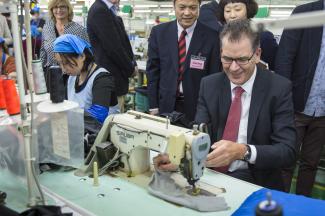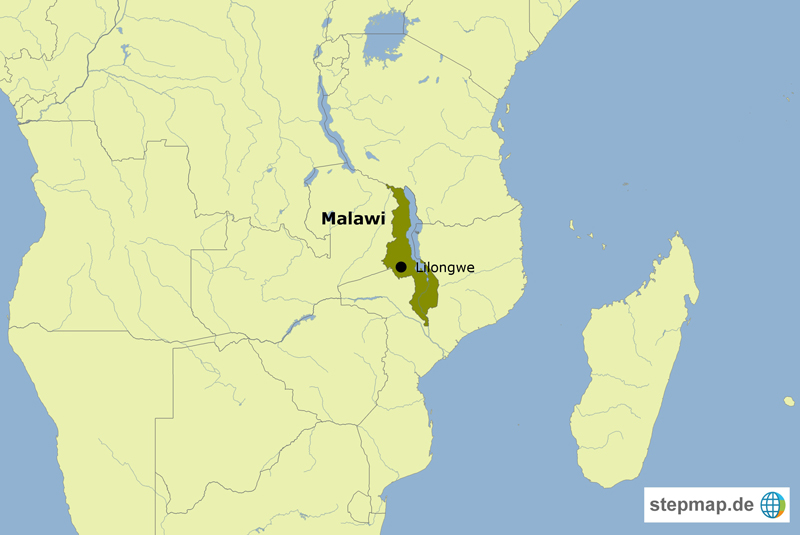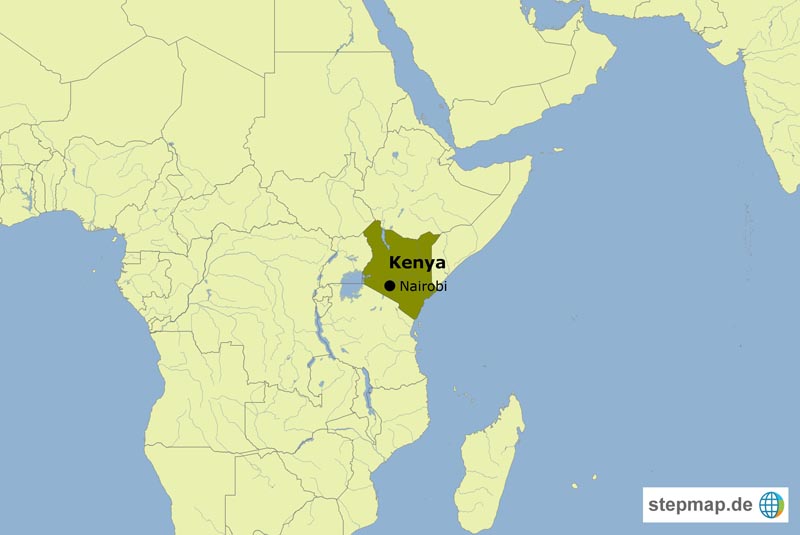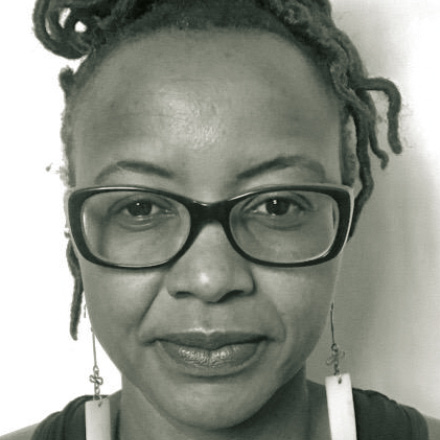Decent work
Quality criteria

On my trip to China last October, I was able, whilst in Jiaxing, to find out more about social and environmental standards in the Chinese textile sector. It was brought home to me once again that every sewing machine is being operated by a person who needs a living wage and a safe and healthy working environment. That naturally applies to working conditions at every stage of production, from the cotton fields to the shop shelves. In China, a great deal has been done in recent years to raise production standards. The country ranks among the world’s leading textile manufacturers. However, garments are also made in other countries, such as Bangladesh, India, Vietnam and Cambodia.
In many places, working conditions do not conform to internationally agreed social and environmental standards. Exploitation and discrimination are a fact of daily life for millions of people working in the clothing industry. The list of negative headlines is long and the problems are often similar: environmental scandals in which untreated effluent is piped into rivers and destroys ecosystems, people working under poor conditions in factories – working days that exceed 16 hours, wages that are not enough to live on, exposure to hazardous chemicals, to name but a few examples. I have personally witnessed children working at a tannery in North Africa, standing barefoot in chemicals with no kind of skin or respiratory protection. Do we really want to put those clothes on our bodies? Tragic accidents like the fire at Ali Enterprises in Pakistan and the collapse of the Rana Plaza factory complex in Bangladesh a number of years ago also show that action is urgently needed.
The rich world has a responsibility for the conditions people work under in developing countries. We cannot just exploit the environment, outsource production and act at home as if everything is hunky dory.
Development policy can play a crucial role in helping to improve social and environmental standards in textile production worldwide. The issue is on the agenda of many of the talks we hold with the governments of partner countries that grow raw materials such as cotton or make and process textiles. We are encouraging and supporting the creation of regulatory frameworks that will bring about improvements in local conditions.
We are also implementing projects in those countries that will directly improve the situation. In Bangladesh, for example, we are assisting the government in training up government inspectors to verify the observance of national health and safety laws, environmental legislation and international standards in factories. We are helping employers’ associations create professional advisory services, for instance to provide advice on fire or building safety issues. And we are supporting the activities of local NGOs in the textile sector – for example by helping to set up “women’s cafés” where female workers are advised on their employment rights. In Bangladesh alone, around 200,000 male and female workers as well as managers and factory owners have taken part in our training projects.
The Textiles Partnership
Development policy cannot tackle the challenges in the textile sector alone however. At the end of April 2014, we issued invitations to a “Textile Round Table”. All those who attended this event – including representatives of German clothing companies, industry associations, trade unions and NGOs – worked together to develop an ambitious plan of action.
Six months later, we established the “Partnership for Sustainable Textiles”, which now has around 60 members. The aim of the initiative is to achieve a critical mass of market actors with the ability to influence social, environmental and economic conditions in producing countries.
The Textiles Partnership has defined binding standards for raw material production and textile and garment manufacturing, for instance at the weaving, dyeing or fabric processing stages. It is guided here by time-honoured international principles for responsible corporate management such as the core labour standards of the International Labour Organization (ILO) and the OECD Guidelines for Multinational Enterprises. Standards that exist in the bio-textile and fairtrade sectors have also been used as guidelines and likewise internationally accepted lists of harmful pesticides and industrial chemicals as well as voluntary codes of practice.
The members of the Textiles Partnership have identified the stages in which the standards defined should be implemented and how their implementation can be verified. The timetable will be reviewed and revised on a regular basis.
Achieving improvements all along the textile supply chain will call for a concerted effort worldwide, which is why we are approaching multinational companies as well as ancillary suppliers, trade unions and governments in producing countries. Recently, for instance, the first four Bangladeshi companies, which together employ around 35,000 people, pledged their support.
Textiles Partnership partners can also profit from numerous German development cooperation programmes. Within the framework of development partnerships with the private sector (develoPPP.de), we are co-financing projects worldwide that are helping to improve production and working conditions in the textile sector – in Burkina Faso, for example, where the focus is on raising the quality of cotton grown by small farmers, or in Vietnam, where we are working with companies in the textile, garment and leather industries to develop an efficient environmental management system.
At the same time, we are in constant dialogue with the EU Commission, EU member states, OECD and ILO to network our various programmes promoting social and environmental sustainability standards. We are actively campaigning for greater acceptance of the Textiles Partnership and its goals and pushing for cooperation to support them. In May 2014, for example, we reached an agreement with the ILO that aspires to improve labour standards in developing countries and global supply chains, above all in Asian partner countries. The topic of sustainability standards is also very high on the G7 agenda during the German presidency.
Consumer power
But we also need to play our part as consumers. With every purchase decision we make, we help to determine whether or not more products made by using socially and environmentally acceptable methods reach the market. Surveys show that there is widespread awareness of this in Germany. Germans take the issue of sustainability seriously when they shop, and many are prepared to pay “fair” prices for “fair” clothes.
Sadly, however, it is still difficult for the consumer to identify sustainable garments. There is a plethora of symbols, seals and labels for textiles, some of them quite opaque. That is why the Textiles Partnership will work to make sustainable clothing more easily identifiable for consumers. We will shortly see the launch of an internet portal designed to clarify the situation, providing a verification platform for many of the textile labels currently in use. The portal will also be available as an app.
The aim of this work is to put the consumer in an increasingly better position to shop with a clear conscience and buy garments made under humane production conditions, with an acceptable environmental impact and at a fair price.
Gerd Müller is Germany’s Federal Minister for Economic Cooperation and Development.
http://www.bmz.de/en












